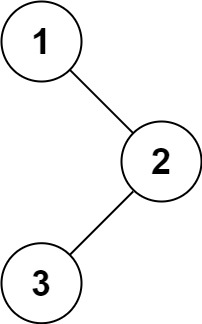LeetCode-in-Java
144. Binary Tree Preorder Traversal
Easy
Given the root of a binary tree, return the preorder traversal of its nodes’ values.
Example 1:

Input: root = [1,null,2,3]
Output: [1,2,3]
Example 2:
Input: root = []
Output: []
Example 3:
Input: root = [1]
Output: [1]
Example 4:

Input: root = [1,2]
Output: [1,2]
Example 5:

Input: root = [1,null,2]
Output: [1,2]
Constraints:
- The number of nodes in the tree is in the range
[0, 100]. -100 <= Node.val <= 100
Follow up: Recursive solution is trivial, could you do it iteratively?
Solution
import com_github_leetcode.TreeNode;
import java.util.ArrayList;
import java.util.List;
import java.util.Stack;
/*
* Definition for a binary tree node.
* public class TreeNode {
* int val;
* TreeNode left;
* TreeNode right;
* TreeNode() {}
* TreeNode(int val) { this.val = val; }
* TreeNode(int val, TreeNode left, TreeNode right) {
* this.val = val;
* this.left = left;
* this.right = right;
* }
* }
*/
@SuppressWarnings("java:S1149")
public class Solution {
public List<Integer> preorderTraversal(TreeNode root) {
List<Integer> result = new ArrayList<>();
if (root == null) {
return result;
}
Stack<TreeNode> stack = new Stack<>();
TreeNode current = root;
while (current != null || !stack.isEmpty()) {
while (current != null) {
result.add(current.val);
stack.push(current.right);
current = current.left;
}
current = stack.pop();
}
return result;
}
}

